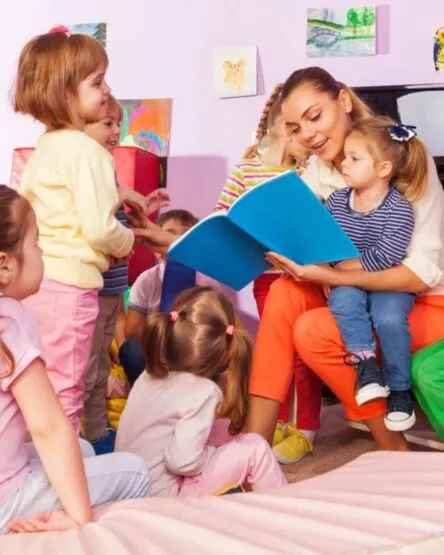How does story time in schools encourage communication in children?
- Enhances language development
- Encourages interactive engagement
- Develops emotional expression
- Strengthens social skills
- Improves cognitive processing
Overview
- Storytime enhances communication skills by improving vocabulary, comprehension, and self-expression. It facilitates interactive engagement, emotional awareness, and social development while strengthening cognitive processing.
- At Reedley, storytelling supports literacy, critical thinking, and confidence in communication, ensuring children build essential skills for academic and social success in a nurturing learning environment.
Strong communication skills enable young children to express their thoughts, build connections, and develop confidence. In kindergarten, interactive activities like story time create a fun and engaging environment for natural language development.
Listening to stories, discussing narratives, and sharing ideas enhance vocabulary, comprehension, and self-expression. These activities help children articulate their thoughts, ask questions, and engage in meaningful conversations—essential skills for both academic success and social growth.
Storytime helps lay a strong foundation for future learning and meaningful interactions by promoting these abilities. Here’s how story time encourages communication in children.
Supports Language Development
Storytime in schools is more than just a chance for children to listen to stories—it plays a key role in developing their language and communication skills. Through engaging narratives, they are introduced to new words, sentence structures, and expressions, helping them build vocabulary and use language with confidence.
Listening to stories also strengthens comprehension and listening skills. As children follow storylines, understand character dialogues, and make sense of events, they learn to process and respond to information effectively. These experiences help them express their thoughts more clearly in everyday conversations.
At Reedley, we design storytime to support early literacy. Our activities focus on phonological awareness, vocabulary building, and comprehension, ensuring a strong foundation for effective communication—both in and beyond the classroom.
Encourages Interactive Engagement
Storytime becomes even more meaningful when children actively participate. Answering questions, predicting what happens next, and discussing characters encourage them to engage with language in a natural way, reinforcing vocabulary and comprehension.
Guided discussions help children think more deeply about stories. As they sequence events, recognize cause and effect, and make predictions, they develop the skills to express their thoughts clearly. These conversations strengthen comprehension and build confidence in sharing ideas.
We create a welcoming space at Reedley where children feel comfortable interacting with stories. Cozy reading corners provide a relaxed setting that encourages focus and participation. By making storytime interactive, we help children connect with others and express themselves confidently.
Develops Emotional Expression
Storytime helps children explore different emotions by introducing them to characters and situations they can relate to. As they listen, they learn to recognize feelings—both their own and others’—which helps them express emotions more clearly. Books also provide examples of how characters handle various emotions, offering healthy ways to express feelings. Discussing these situations during or after storytime deepens understanding and gives children the chance to practice sharing emotions, making it easier to communicate with others.
Additionally, stories encourage children to step into the shoes of different characters, fostering empathy. When they understand how others feel, they become better equipped to respond to situations, improving their social skills. How story time encourages communication in children is reflected in how it helps them recognize emotions, express themselves, and connect with others.
We create a space at Reedley where children can safely explore emotions. Through stories and engaging discussions, they build strong communication skills they will carry with them every day.
Strengthens Social Skills
Storytime strengthens your child’s social skills by inviting them to actively engage with the story. As they ask questions, make predictions, and discuss characters or events, they improve their ability to articulate thoughts clearly, boosting their verbal communication skills.
It also encourages a bonding experience between children and their caregivers or teachers. This shared activity creates a sense of security, allowing your child to feel more comfortable expressing themselves openly. With this trust, they gain confidence in initiating conversations and building meaningful social connections.
Teachers also encourage social and emotional growth by guiding children to manage emotions, communicate openly, and resolve conflicts. These positive interactions help children feel more secure and better prepared for future social situations.
Lastly, storytelling helps children understand different emotions and relate to others. Through stories, they not only build vocabulary but also learn social lessons like empathy and how to express feelings. This makes storytime an essential part of your child’s development, promoting both social interaction and a love for learning.
Improves Cognitive Processing
Storytime helps develop cognitive and communication skills in children by encouraging imagination, critical thinking, and active listening. As they engage with stories, they visualize scenarios, predict outcomes, and relate events to personal experiences, deepening comprehension. This process improves their ability to articulate thoughts and express emotions.
Regular storytime enhances focus, listening skills, and thoughtful responses, fostering cognitive growth. At Reedley, we incorporate interactive storytelling into our curriculum to strengthen comprehension, critical thinking, and communication. By nurturing these abilities, we help children build confidence and develop essential skills for both academic success and social interactions.
Key Takeaway
There are many ways that regular storytelling can help your bright young learner develop much-needed communication skills. By engaging with stories, children not only improve their vocabulary and comprehension but also enhance their ability to express themselves clearly and confidently in various social settings.
Give your child the opportunity to thrive at Reedley International School! Discover our well-rounded programs and supportive learning environment. Contact us today to learn more!
